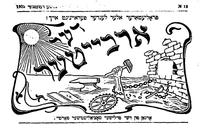- Der arbeyter
-
Der arbeyter 
Publisher Polish Socialist Party Editor Maks Horwitz, Leon Wasilewski, Feliks Sachs Founded 1898 Political alignment Socialist Language Yiddish Ceased publication 1905 Headquarters London (1898-1901), Vilna (1902-), Warsaw (1905-) Circulation 1,500 (1898), 20,000 (1905) Yiddish
 Journalism
Journalism
Radio Programs: - Di Forverts Sho
- Dos Yiddishe kol
- SBS Yiddish
- Kol Yisrael
- Naye Khvalyes Poland
- Sveriges Radio Yiddish program Sweden
Daily news online: - Yiddishworld.com
Weekly newspapers: - Der Yid
- Der Blatt
- Di Tzeitung
- Algemeiner Journal
- Forward
Magazines: - Beleichtungen
- Maalos
- Oneg Shabbos
- Tzeitshrift
- Shpaktiv
- Oyfn Shvel
- Yerushalaymer Almanak
- Gigulim
- Toplpunkt
- Yugntruf
- Di naye gvardie
- Dos yidishe kol
- Yidishe heftn
Hotline broadcasting: - Kol Hacharedi
- Kol Hanayes
- Kol Mevaser
Der arbeyter (דער ארבײטער, 'The Workers') was a Yiddish-language newspaper, issued by the Polish Socialist Party (PPS). The newspaper was launched in 1898[1], named after a Galician Jewish social democratic publication by the same name.[2] Der arbeyter was initially published from London.[3]
Contents
London period
Initially Der arbeyter had a circulation of 1,500 copies, intended for distribution inside Congress Poland. Maks Horwitz, the sole Yiddish-speaking intellectual in PPS at the time, was the founding editor of the publication.[3]
Der arbeyter argued that an Polish democratic republic had to be established in order to achieve Jewish emancipation and socialism.[1] It opposed Russification of the Jewish population in Poland. Furthermore, it consistently used the term 'Jew' as a religious, not national, denomination. Catholic Poles were labelled as 'Christians' in its articles, and the publication stressed that Jewish and Christians alike were equally part of the Polish nation and the Polish proletariat. This approach contrasted the line of the General Jewish Labour Bund, who argued that Jews constituted a separate national group in the Russian empire.[4]
Der arbeyter was mainly directed towards mobilizing support for PPS amongst Jewish workers in Poland. The PPS lagged behind its competitor, the General Jewish Labour Bund, in terms of Yiddish-language publishing. Thus, PPS felt it could not compete with the Bundist press amongst the Jewish intelligentsia, it concentrated its propaganda work toward Jewish labourers.[3] Der arbeyter dealt with questions of everyday working class life, rather than theoretical articles.[5]
Horwitz, who had edited the first edition of Der arbeyter, was arrested in Warsaw in 1899. Thus the PPS no longer had any person who could manage a Yiddish publication. After Horwitz's arrest, the PPS cadre Leon Wasilewski learned Yiddish so that the publication could be continued and a second edition could be published.[3] With the arrival of Feliks Sachs, who spoke fluent Yiddish, to the PPS centre in London, two more editions were published in 1901 (April and August).[6] Sachs eventually became the editor of Der arbeyter and the head of the Jewish section of PPS.[7]
Shift to Vilna
In 1902, the seventh issue of Der arbeyter was published. Now the publishing had shifted from London to Vilna. Detached from the PPS centre in London, Sachs implemented changes in the editorial line of the paper. It began to talk about the Jewish people as a separate national group, and about Poland and Lithuania as two separate countries.[8]
In 1902 the PPS centre in London began publishing a new Yiddish periodical, Di proletarishe velt.[9]
Warsaw weekly
As of 1905 (the year of revolution in the Russian empire), Der arbeyter had become a weekly paper published from Warsaw and reached a circulation of 20,000.[10] The publication ceased later the same year.[11]
References
- ^ a b Jacobs, Jack Lester. Jewish Politics in Eastern Europe: The Bund at 100. Basingstoke: Palgrave, 2001. p. 32
- ^ Frankel, Jonathan. Prophecy and Politics: Socialism, Nationalism, and the Russian Jews, 1862-1917. Cambridge [England]: Cambridge University Press, 1984. p. 217
- ^ a b c d Zimmerman, Joshua D. Poles, Jews, and the Politics of Nationality: The Bund and the Polish Socialist Party in Late Tsarist Russia, 1892-1914. Madison, Wisc: University of Wisconsin Press, 2004. pp. 132-133, 135
- ^ Zimmerman, Joshua D. Poles, Jews, and the Politics of Nationality: The Bund and the Polish Socialist Party in Late Tsarist Russia, 1892-1914. Madison, Wisc: University of Wisconsin Press, 2004. pp. 143, 153
- ^ Zimmerman, Joshua D. Poles, Jews, and the Politics of Nationality: The Bund and the Polish Socialist Party in Late Tsarist Russia, 1892-1914. Madison, Wisc: University of Wisconsin Press, 2004. p. 139
- ^ Zimmerman, Joshua D. Poles, Jews, and the Politics of Nationality: The Bund and the Polish Socialist Party in Late Tsarist Russia, 1892-1914. Madison, Wisc: University of Wisconsin Press, 2004. p. 142
- ^ Zimmerman, Joshua D. Poles, Jews, and the Politics of Nationality: The Bund and the Polish Socialist Party in Late Tsarist Russia, 1892-1914. Madison, Wisc: University of Wisconsin Press, 2004. p. 165
- ^ Zimmerman, Joshua D. Poles, Jews, and the Politics of Nationality: The Bund and the Polish Socialist Party in Late Tsarist Russia, 1892-1914. Madison, Wisc: University of Wisconsin Press, 2004. pp. 170-171
- ^ Zimmerman, Joshua D. Poles, Jews, and the Politics of Nationality: The Bund and the Polish Socialist Party in Late Tsarist Russia, 1892-1914. Madison, Wisc: University of Wisconsin Press, 2004. p. 179
- ^ Zimmerman, Joshua D. Poles, Jews, and the Politics of Nationality: The Bund and the Polish Socialist Party in Late Tsarist Russia, 1892-1914. Madison, Wisc: University of Wisconsin Press, 2004. p. 210
- ^ Zaglembie
Categories:- Publications established in 1898
- Publications disestablished in 1905
- Yiddish newspapers
- Defunct newspapers of Poland
- Socialist newspapers
- Polish Socialist Party
Wikimedia Foundation. 2010.
